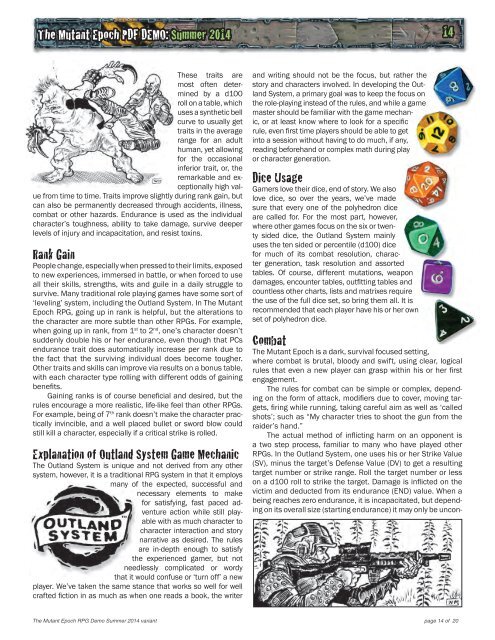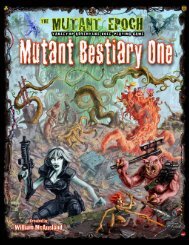The-Mutant-Epoch-RPG-Hub-Rules-DEMO
The-Mutant-Epoch-RPG-Hub-Rules-DEMO
The-Mutant-Epoch-RPG-Hub-Rules-DEMO
Create successful ePaper yourself
Turn your PDF publications into a flip-book with our unique Google optimized e-Paper software.
<strong>The</strong> <strong>Mutant</strong> <strong>Epoch</strong> PDF <strong>DEMO</strong>: Summer 201414<strong>The</strong>se traits aremost often determinedby a d100roll on a table, whichuses a synthetic bellcurve to usually gettraits in the averagerange for an adulthuman, yet allowingfor the occasionalinferior trait, or, theremarkable and exceptionallyhigh valuefrom time to time. Traits improve slightly during rank gain, butcan also be permanently decreased through accidents, illness,combat or other hazards. Endurance is used as the individualcharacter’s toughness, ability to take damage, survive deeperlevels of injury and incapacitation, and resist toxins.Rank GainPeople change, especially when pressed to their limits, exposedto new experiences, immersed in battle, or when forced to useall their skills, strengths, wits and guile in a daily struggle tosurvive. Many traditional role playing games have some sort of‘leveling’ system, including the Outland System. In <strong>The</strong> <strong>Mutant</strong><strong>Epoch</strong> <strong>RPG</strong>, going up in rank is helpful, but the alterations tothe character are more subtle than other <strong>RPG</strong>s. For example,when going up in rank, from 1 st to 2 nd , one’s character doesn’tsuddenly double his or her endurance, even though that PCsendurance trait does automatically increase per rank due tothe fact that the surviving individual does become tougher.Other traits and skills can improve via results on a bonus table,with each character type rolling with different odds of gainingbenefits.Gaining ranks is of course beneficial and desired, but therules encourage a more realistic, life-like feel than other <strong>RPG</strong>s.For example, being of 7 th rank doesn’t make the character practicallyinvincible, and a well placed bullet or sword blow couldstill kill a character, especially if a critical strike is rolled.Explanation of Outland System Game Mechanic<strong>The</strong> Outland System is unique and not derived from any othersystem, however, it is a traditional <strong>RPG</strong> system in that it employsmany of the expected, successful andnecessary elements to makefor satisfying, fast paced adventureaction while still playablewith as much character tocharacter interaction and storynarrative as desired. <strong>The</strong> rulesare in-depth enough to satisfythe experienced gamer, but notneedlessly complicated or wordythat it would confuse or ‘turn off’ a newplayer. We’ve taken the same stance that works so well for wellcrafted fiction in as much as when one reads a book, the writerand writing should not be the focus, but rather thestory and characters involved. In developing the OutlandSystem, a primary goal was to keep the focus onthe role-playing instead of the rules, and while a gamemaster should be familiar with the game mechanic,or at least know where to look for a specificrule, even first time players should be able to getinto a session without having to do much, if any,reading beforehand or complex math during playor character generation.Dice UsageGamers love their dice, end of story. We alsolove dice, so over the years, we’ve madesure that every one of the polyhedron diceare called for. For the most part, however,where other games focus on the six or twentysided dice, the Outland System mainlyuses the ten sided or percentile (d100) dicefor much of its combat resolution, charactergeneration, task resolution and assortedtables. Of course, different mutations, weapondamages, encounter tables, outfitting tables andcountless other charts, lists and matrixes requirethe use of the full dice set, so bring them all. It isrecommended that each player have his or her ownset of polyhedron dice.Combat<strong>The</strong> <strong>Mutant</strong> <strong>Epoch</strong> is a dark, survival focused setting,where combat is brutal, bloody and swift, using clear, logicalrules that even a new player can grasp within his or her firstengagement.<strong>The</strong> rules for combat can be simple or complex, dependingon the form of attack, modifiers due to cover, moving targets,firing while running, taking careful aim as well as ‘calledshots’; such as “My character tries to shoot the gun from theraider’s hand.”<strong>The</strong> actual method of inflicting harm on an opponent isa two step process, familiar to many who have played other<strong>RPG</strong>s. In the Outland System, one uses his or her Strike Value(SV), minus the target’s Defense Value (DV) to get a resultingtarget number or strike range. Roll the target number or lesson a d100 roll to strike the target. Damage is inflicted on thevictim and deducted from its endurance (END) value. When abeing reaches zero endurance, it is incapacitated, but dependingon its overall size (starting endurance) it may only be uncon-<strong>The</strong> <strong>Mutant</strong> <strong>Epoch</strong> <strong>RPG</strong> Demo Summer 2014 variant page 14 of 20



